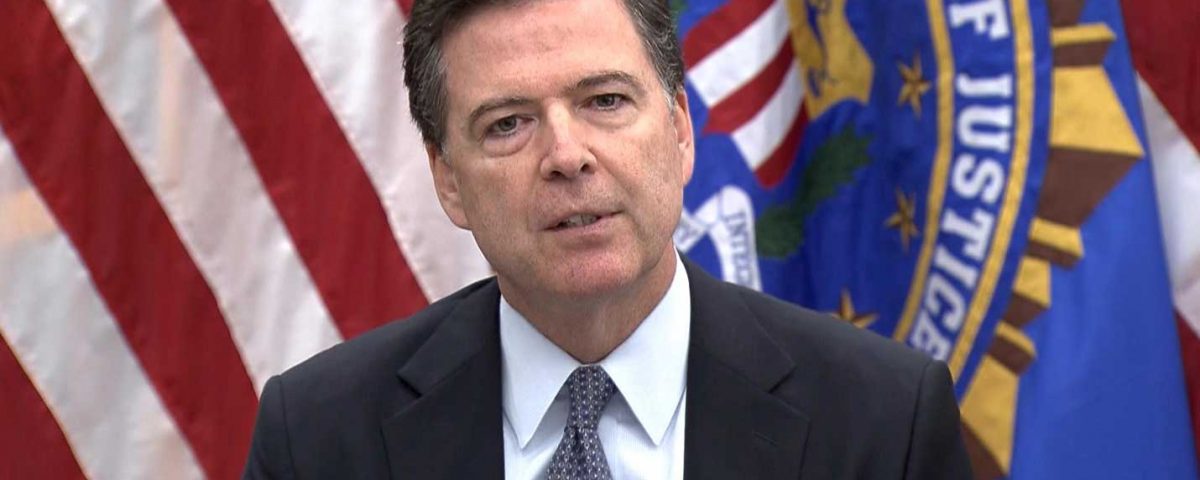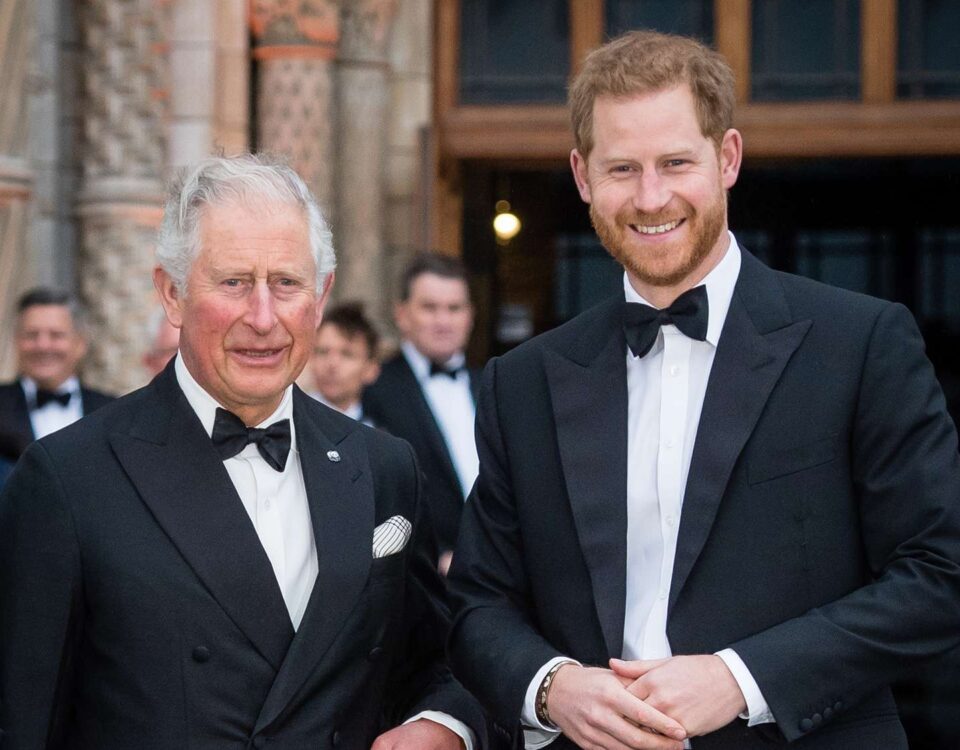
Top 5 Strategies to Advertise your Business!
May 14, 2017
Italian Chicken and Peppers Recipe
May 18, 2017James Brien “Jim” Comey Jr. (born December 14, 1960) is an American lawyer who served as the seventh Director of the Federal Bureau of Investigation (FBI) from September 2013 until May 2017.
Comey was the U.S. Attorney for the Southern District of New York from January 2002 to December 2003, and subsequently the United States Deputy Attorney General from December 2003 to August 2005. Comey appointed Patrick Fitzgerald to be the Special Counsel to head the grand jury investigation into the Plame affair, after Attorney General John Ashcroft recused himself.
In August 2005, Comey left the DOJ and became general counsel and senior vice president of Lockheed Martin, based in Bethesda, Maryland. In 2010, he became general counsel at Bridgewater Associates, based in Westport, Connecticut. In early 2013, he left Bridgewater to become a Senior Research Scholar and Hertog Fellow on National Security Law at Columbia Law School. He served on the Board of Directors of HSBC Holdings until July 2013.
In September 2013, Comey was appointed Director of the FBI by President Barack Obama. In that capacity, he was responsible for overseeing the FBI’s investigation of the Hillary Clinton email controversy. His role in the 2016 U.S. presidential election, particularly with regard to his public communications, was highly controversial. His decisions have been regarded by many analysts, including Nate Silver of FiveThirtyEight, to have likely cost Clinton the election.
Comey was dismissed by President Donald Trump on May 9, 2017, reportedly days after Comey requested increased funding from the U.S. Department of Justice for the FBI’s investigation into Russia’s interference in the presidential election; the Justice Department called The New York Times report that Comey asked for more funding “totally false”. A statement released by the White House said that removing Comey will help bring the Russia investigation to a conclusion. Later that day, Trump stated that he was thinking of “this Russia thing with Trump and Russia” when he decided to fire Comey.
Early Life
Born in Yonkers, New York, Comey grew up in Allendale, New Jersey, the son of Joan (Herald) and J. Brien Comey. His father worked in corporate real estate and his mother was a computer consultant and homemaker. Comey is of Irish heritage. He attended Northern Highlands Regional High School in Allendale. Comey graduated from the College of William and Mary in 1982, majoring in chemistry and religion. His senior thesis analyzed the liberal theologian Reinhold Niebuhr and the conservative televangelist Jerry Falwell, emphasizing their common belief in public action. He received his Juris Doctor (J.D.) from the University of Chicago Law School in 1985.

Early career (1985–1993)
After law school, Comey served as a law clerk for then-United States District Judge John M. Walker, Jr., in Manhattan. Then, he was an associate for Gibson, Dunn & Crutcher in their New York office. He joined the U.S. Attorney’s Office for the Southern District of New York, where he worked from 1987 to 1993. While there, he served as Deputy Chief of the Criminal Division. He helped prosecute the Gambino crime family.
Clinton years (1996-2001)
Assistant U.S. Attorney
From 1996 to 2001, Comey served as Managing Assistant U.S. Attorney in charge of the Richmond Division of the United States Attorney for the Eastern District of Virginia. In 1996, Comey acted as deputy special counsel to the Senate Whitewater Committee. He also served as the lead prosecutor in the case concerning the 1996 Khobar Towers bombing in Saudi Arabia. While in Richmond, Comey served as an Adjunct Professor of Law at the University of Richmond School of Law.
Bush years (2002–2005)
U.S. Attorney
He was the United States Attorney for the Southern District of New York, from January 2002 to the time of his confirmation as Deputy Attorney General on December 11, 2003. Among his first tasks was to take over the investigation into President Bill Clinton’s controversial pardon of Marc Rich. In November 2002, he led the prosecution of three men involved in one of the largest identity fraud cases in American history. The fraud had lasted two years and resulted in thousands of people across the country collectively losing well over $3 million. He also led the indictment of Adelphia Communications founder John Rigas for bank fraud, wire fraud, and securities fraud. Rigas was convicted of the charges in 2004 and in 2005, was sentenced to 15 years in federal prison. Adelphia Corporation was forced to file for bankruptcy, after it acknowledged it took $3.3 billion in false loans. It was “one of the most elaborate and extensive corporate frauds in United States history”.
In February 2003, Comey led the prosecution of Martha Stewart, who was indicted on the charges of securities fraud, obstruction of justice, and lying to an FBI agent. She sold 3,928 shares of ImClone Systems, making $227,824. The next day, the Food and Drug Administration refused to accept the company’s application for Erbitux. In March 2003, he led the indictment of ImClone CEO Samuel Waksal, who pleaded guilty to avoiding paying $1.2 million in sales taxes on $15 million worth of contemporary paintings. The works were by Mark Rothko, Richard Serra, Roy Lichtenstein, and Willem de Kooning. In April 2003, he led the indictment of Frank Quattrone, who allegedly urged subordinates in 2000 to destroy evidence sought by investigators looking into his investment banking practices at Credit Suisse First Boston. In November 2003, he led the prosecutions in “Operation Wooden Nickel”, which resulted in complaints and indictments against 47 people involved in foreign exchange trading scams.
Deputy Attorney General
NSA domestic wiretapping
In early January 2006, The New York Times, as part of its investigation into domestic surveillance by the National Security Agency, reported that Comey, who was Acting Attorney General during the March 2004 hospitalization of John Ashcroft, refused to certify the legality of central aspects of the NSA program. The certification was required under White House procedures in order for the program to continue.
After Comey’s refusal, the newspaper reported, Andrew H. Card Jr., White House Chief of Staff, and Alberto R. Gonzales, then White House counsel and future Attorney General, made a visit to the George Washington University Hospital, to attempt to win approval directly from Ashcroft for the program. According to the 2007 memoir of Jack Goldsmith, who had been head of the Office of Legal Counsel at the time, Comey went to the hospital to give Ashcroft support in withstanding pressure from the White House.
Comey confirmed these events took place (but declined to confirm the specific program) in testimony to the Senate Judiciary Committee on May 16, 2007. FBI Director Robert S. Mueller III, like Comey, also supported Ashcroft’s decision; both men were prepared to resign if the White House ignored the Department of Justice’s legal conclusions on the wiretapping issue. FBI director Mueller’s notes on the March 10, 2004, incident, which were released to a House Judiciary committee, confirms that he “Saw [the] AG, John Ashcroft in the room. AG is feeble, barely articulate, clearly stressed.” Comey withdrew his threat to resign after meeting directly with President Bush, who gave his support to making changes in the surveillance program.
FBI Director
In May 2013, it was reported, and in June 2013 it was made official, that President Barack Obama would nominate Comey to be the next Director of the Federal Bureau of Investigation, replacing outgoing director Robert Mueller. Comey was reportedly chosen over finalist Lisa Monaco, who had overseen national security issues at the Justice Department during the attack on the U.S. consulate in Benghazi, Libya, on September 11, 2012.
Comey was confirmed by the Senate on July 29, 2013, for a full ten-year term running the Federal Bureau of Investigation. He was sworn in as FBI director on September 4, 2013. President Donald Trump fired him on May 9, 2017.
In February 2015, Comey delivered a speech at Georgetown University in Washington, D.C., regarding the relationship between police and the African American community.
Comey said. “At many points in American history, law enforcement enforced the status quo — a status quo that was often brutally unfair to disfavored groups,” including his own Irish ancestors. Law enforcement often treated the Irish unfairly and often regarded them as drunks and criminals in the early 20th century, he said. “The Irish had some tough times, but little compares to the experience on our soil of black Americans.” Deep-rooted societal problems often lead young black men to crime and create tensions with law enforcement, he said.
“Police officers on patrol in our nation’s cities often work in environments where a hugely disproportionate percentage of street crime is committed by young men of color,” Comey said. “Something happens to people of good will working in that environment. After years of police work, officers often can’t help be influenced by the cynicism they feel. A mental shortcut becomes almost irresistible.”
In October 2015, Comey gave a speech raising concerns that body worn video results in less effective policing, contradicting the President’s public position. Days later, President Obama met with Comey in the Oval Office to address the issue.
In an October 23 speech at the University of Chicago Law School Comey said: “I remember being asked why we were doing so much prosecuting in black neighborhoods and locking up so many black men. After all, Richmond was surrounded by areas with largely white populations. Surely there were drug dealers in the suburbs. My answer was simple: We are there in those neighborhoods because that’s where people are dying. These are the guys we lock up because they are the predators choking off the life of a community. We did this work because we believed that all lives matter, especially the most vulnerable.”
Hillary Clinton email investigation
On July 10, 2015, the FBI opened a criminal investigation into Hillary Clinton. In April 2015, Comey had objected when former General David Petraeus was allowed to plead guilty to only a misdemeanor of mishandling classified information.
Attorney General Loretta Lynch instructed Comey to refer to the FBI’s activities as a “matter” rather than an investigation, which concerned Comey. Comey was further concerned when the FBI intercepted on Russian networks a stolen internal Democratic Party memo anticipating Lynch would protect Clinton from prosecution, leading Comey to fear the Russians might leak the memo. On June 29, Lynch and Bill Clinton met aboard her plane on the tarmac of the Phoenix Sky Harbor International Airport, leading to calls for her recusal. Lynch then announced that she would “fully” accept the recommendation of the FBI regarding the probe. On July 2, FBI agents interviewed Mrs. Clinton at FBI headquarters.
On July 5, 2016, Comey announced the FBI’s recommendation that the United States Department of Justice file no criminal charges relating to the Hillary Clinton email controversy. During a 15-minute press conference in the J. Edgar Hoover Building, Comey called Secretary Clinton’s and her top aides’ behavior “extremely careless”, but concluded that “no reasonable prosecutor would bring such a case”. It was believed to be the first time the FBI disclosed its prosecutorial recommendation to the Department of Justice publicly. On July 7, 2016, Comey was questioned by a Republican-led House committee during a hearing regarding the FBI’s recommendation.
On May 2, 2017, President Donald Trump tweeted: “FBI Director Comey was the best thing that ever happened to Hillary Clinton in that he gave her a free pass for many bad deeds!”
Russian election interference investigation
The same day as Comey’s July press conference, the FBI acquired the Donald Trump-Russia dossier by Christopher Steele. The FBI opened an investigation into the Trump campaign in late July. Comey asked President Obama permission to write an op-ed warning the public that the Russians were interfering in the election, which the President refused. CIA Director John O. Brennan then gave an unusual private briefing to Senate Minority Leader Harry Reid on the Russians, which Reid then publicly referred to. Comey, however, refused to confirm the Trump Campaign was under investigation, even in classified Congressional briefings. In early October, meetings were held in the White House Situation Room where National Security Advisor Susan Rice argued that they should release the information, while Comey now argued disclosure was no longer needed.
In January 2017, Comey first met Trump when he briefed the President-elect on the Steele dossier. On January 27, 2017, Trump and Comey had dinner alone together at the White House. According to Trump, Comey requested the dinner so as to ask to keep his job and, when asked, told Trump that he was not under investigation, also adding that he did not ask Comey to pledge his loyalty. According to Comey’s associates, Trump requested the dinner, asked Comey to pledge his loyalty, twice, to which Comey replied, twice, that he would always be honest, until Trump asked him if he would promise “honest loyalty”, which Comey did.
On March 4, 2017, Comey asked the Justice Department for permission, which was not given, to publicly refute Trump’s claim that his phones had been wiretapped by then-President Obama.
On March 20, 2017, in testimony before the House Intelligence Committee, Comey confirmed that the FBI has been investigating possible coordination between the Trump campaign and Russia, and whether any crimes were committed. During the hearing, the White House Twitter account posted “The NSA and FBI tell Congress that Russia did not influence the electoral process”, which Comey, when then read the tweet by Congressman Jim Himes, directly refuted. Comey also refuted the President’s Trump Tower wiretapping allegations, testifying “I have no information that supports those tweets, and we have looked carefully inside the FBI”.
Representative Chris Stewart asked Comey in the hearing: “Mr. Clapper then went on to say that to his knowledge there was no evidence of collusion between members of the Trump campaign and the Russians. We did not conclude any evidence in our report and when I say “our report,” that is the NSA, FBI, and CIA with my office, the director of national intelligence said anything — any reflection of collusion between the members of Trump campaign and the Russians, there was no evidence of that in our report. Was Mr. Clapper wrong when he said that?” Comey responded: “I think he’s right about characterizing the report which you all have read.” Press Secretary Sean Spicer and a White House tweet then highlighted this testimony as proof that Clapper was “right” there was no evidence of collusion, causing Clapper to release a statement clarifying he had been referring to the evidence as gathered in January and that more investigation is needed.
On May 3, 2017, in testimony before the Senate Judiciary Committee, Comey said that Russia is the “greatest threat of any nation on Earth … One of the biggest lessons learned is that Russia will do this again. Because of 2016 election, they know it worked.” He also said that Russia should pay a price for interfering.
In early May, a few days before he was fired, Comey asked the Justice Department for a significant increase in funding and personnel for the Russia probe.
Comey had been scheduled to testify before the Senate Intelligence Committee on May 11, but after he was dismissed on May 9, committee chair Senator Richard Burr said that Acting FBI Director Andrew McCabe would appear instead. Ranking committee member Senator Mark Warner said that Comey would be invited to testify on May 16 or “as soon as he can.”
Dismissal
On May 9, 2017, President Trump fired Comey. The White House initially said the firing was on the recommendation of United States Attorney General Jeff Sessions and Deputy Attorney General Rod Rosenstein. Rosenstein had sent a memorandum to Sessions, forwarded to Trump, in which Rosenstein listed objections to Comey’s conduct in the investigation into Hillary Clinton’s emails. This allowed the Trump administration to attribute Comey’s firing to Rosenstein’s recommendation about the Clinton email controversy. It was later revealed that on May 8, Trump had requested Sessions and Rosenstein to detail in writing a case against Comey. Rosenstein’s memo was forwarded to Trump on May 9 and was construed as a recommendation to dismiss Comey, which Trump immediately did. In his termination letter he attributed the firing to the two letters from Sessions and Rosenstein. The Washington Post reported that Rosenstein threatened to resign over the White House’s attribution of Comey’s dismissal to his memo, which Rosenstein has denied.
On May 10, Trump told reporters he had fired Comey because he “wasn’t doing a good job”. On May 11, President Trump told Lester Holt in a NBC News interview that Comey was “a showboat” and “grandstander”, that his dismissal was “my decision” and “I was going to fire regardless of recommendation”, directly contradicting the earlier statements by the White House and Vice President Mike Pence.
According to reports, Trump had been openly talking to aides about firing Comey for at least a week before his dismissal. Trump had long questioned Comey’s loyalty and judgment. Moreover, Trump was angry that Comey would not support his claim that President Barack Obama had his campaign offices wiretapped and frustrated when Comey revealed in Senate testimony the breadth of the counterintelligence investigation into Russia’s effort to sway the 2016 U.S. presidential election. He felt Comey was giving too much attention to the Russia probe and not enough to internal leaks to the press from within the government. Shortly before Comey was fired, he had requested money and resources to further expand the probe into Russian interference into the Presidential election.
Comey’s termination was immediately controversial. It was compared to the Saturday Night Massacre, President Richard Nixon’s termination of special prosecutor Archibald Cox, who had been investigating the Watergate scandal, and to the firing of Acting Attorney General Sally Yates in January 2017. Many members of Congress expressed concern over the firing and argued that it would put the integrity of the investigation into jeopardy. Critics accused Trump of obstruction of justice.
In the dismissal letter, Trump wrote that Comey had told Trump “on three separate occasions that I am not under investigation.” Fact checkers reported that while they have no way of knowing what Comey may have told Trump privately, no such assertion is on the public record of Comey directly stating that Trump is not personally under investigation. Instead, as per Comey’s sworn testimony to U.S. Congress days prior, the statements on the public record are those which confirm that various persons—without confirming or denying specific persons—involved in Trump’s campaign are being investigated, and his refusal to exclude Trump from individual investigation if that is where the evidentiary trail leads to. Trump later specified the three occasions in which he alleges he asked Comey if he was personally under investatgation: a private White House dinner, and two telephone calls. Associates of Comey offered a different version of what was said during the dinner.


